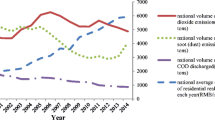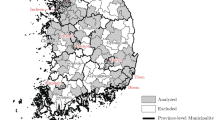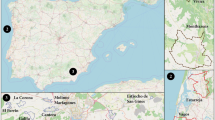Abstract
This paper establishes a causal relation between households’ decision of asset allocation and environmental pollution based on urban PM2.5 concentration data and a nationally representative survey in China. We find a significantly negative effect of environmental pollution on households’ demand for housing assets but an inverted U-shaped effect on the demand for risky assets. The effects are remarkably robust to correcting the endogenous issue and a battery of robustness checks. Social interaction can partly explain such an effect of pollution. Furthermore, we also find that because households with lower economic status are at greater risk of exposure to environmental pollution and lack of economic capabilities, their holdings of financial assets decrease more than that of the households with higher economic status when faced with pollution; however, their holdings of low liquid assets declining less.



Similar content being viewed by others
Data Availability
The data that support the findings of this study are available from China Institute for Income Distribution but restrictions apply to the availability of these data, which were used under license for the current study, and so are not publicly available. Data are however available from the authors upon reasonable request and with permission of China Institute for Income Distribution.
Notes
Marx K. H. and Engels F. (1961). German Ideology, People’s Publishing House, 545
The data of land surface pressure can be downloaded at https://apps.ecmwf.int/datasets/
The CHIP can be downloaded at http://ciid.bnu.edu.cn/chip/chips.asp?year=2002
The data of PM2.5 can be downloaded at http://sedac.ciesin.columbia.edu/
The marginal effect is calculated at the mean of the control variables. The same below
References
Ayyagari PD (2017) The role of medical expenditure risk in portfolio allocation decisions. Health Econ 26(11):1447–1458. https://doi.org/10.1002/hec.3437
Baker M, Wurgler J (2006) Investor sentiment and the cross-section of stock returns. Econ Manag J 61(4):1645–1680. https://doi.org/10.3386/w10449
Berkowitz MK, Qiu J (2006) A further look at household portfolio choice and health status. J Bank Financ 30(4):1201–1217. https://doi.org/10.1016/j.jbankfin.2005.05.006
Bertocchi G, Brunetti M, Torricelli C (2011) Marriage and other risky assets: a portfolio approach. J Bank Financ 35(11):2902–2915. https://doi.org/10.1016/j.jbankfin.2011.03.019
Bilias Y, Georgarakos D, Haliassos M (2017) Has greater stock market participation increased wealth inequality in the US? Rev Income Wealth 63(1):169–188. https://doi.org/10.1111/roiw.12225
Bonaparte Y, Korniotis GM, Kumar A (2014) Income hedging and portfolio decisions. J Financ Econ 113(2):300–324. https://doi.org/10.2139/ssrn.2172846
Broer T (2017) The home bias of the poor: Foreign asset portfolios across the wealth distribution. Eur Econ Rev 92(C):74–91. https://doi.org/10.1016/j.euroecorev.2016.11.008
Brown JR, Ivkovich Z, Weisbenner SS (2008) Neighbors matter: causal community effects and stock market participation. J Financ 63(3):1509–1531. https://doi.org/10.3386/w13168
Chay KY, Greenstone M (2005) Does air quality matter? Evidence from the housing market. Soc Sci Electron Publ 113(2):376–424. https://doi.org/10.3386/w6826
Chen J, Hao Q, Yoon C et al (2018a) Measuring the welfare cost of air pollution in Shanghai: evidence from the housing market. J Environ Plan Manag 61(10):1–14. https://doi.org/10.1080/09640568.2017.1371581
Chen S, Oliva P, Zhang P (2018b) Air pollution and mental health: evidence from China, NBER Working Paper NO.24686. https://doi.org/10.3386/w24686
Chen X, Zhang XB, Zhang X (2018c) Smog in our brains: gender differences in the impact of exposure to air pollution on cognitive performance, GLO discussion paper series 32
Davis JC, Huston JH (1992) The shrinking middle-income class: a multivariate analysis. East Econ J 18(3):277–285
Dolan P, Laffan K (2016) Bad air days: the effects of air quality on different measures of subjective well-being. J Benefit-Cost Anal 7(1):147–195. https://doi.org/10.1017/bca.2016.7
Evans GW, Campbell JM (1983) Psychological perspectives on air pollution and health. Basic Appl Soc Psychol 4(2):137–169
Fagereng A, Gottlieb C, Guiso L (2013) Asset market participation and portfolio choice over the life-cycle. J Financ 72(2):705–750. https://doi.org/10.1111/jofi.12484
Fan E, Zhao R (2009) Health status and portfolio choice: causality or heterogeneity? J Bank Financ 33(6):1079–1088. https://doi.org/10.1016/j.jbankfin.2008.12.019
Flavin M, Nakagawa S (2008) A model of housing in the presence of adjustment costs: a structural interpretation of habit persistence. Am Econ Rev 98(1):474–495. https://doi.org/10.1257/aer.98.1.474
Gu D, Huang NW, Zhang MX, Wang F (2015) Under the dome: air pollution, wellbeing and pro-environmental behavior among Beijing residents. J Pac Rim Psychol 9(2):65–77. https://doi.org/10.1017/prp.2015.10
Haliassos M, Bertaut CC (1995) Why do so few hold stocks? Econ J 105(432):1110–1129. https://doi.org/10.2307/2235407
He MQ, Liu ZH, Zhang Y, Zhang Y, Yan Y, Huang G, Zhang J, Chen JH, He M, Fan WB (2017) Analyses on the spatial-temporal distribution features and causing factors of atmospheric haze in the southern city-group of Sichuan. China Environ Sci (02):432–442
Heaton JC, Lucas DJ (2000) Portfolio choice and asset prices: the importance of entrepreneurial risk. J Financ 55(3):1163–1198. https://doi.org/10.1111/0022-1082.00244
Hong H, Kubik JD, Stein JC (2004) Social Interaction and stock-market participation. J Financ 59(2):137–163. https://doi.org/10.3386/w8358
Jianakoplos N, Bernasek A (1998) Are women more risk averse. Econ Inq 36(4):620–630. https://doi.org/10.1111/j.1465-7295.1998.tb01740.x
Kamstra MJ, Kramer LA, Levi MD (2000) Losing sleep at the market: the day light-saving anomaly. Am Econ Rev 90(4):1000–1005. https://doi.org/10.1257/00028280260344795
Kimball MS (1990) Precautionary saving in the small and in the large. Econometrica 58(1):3–73. https://doi.org/10.3386/w2848
Kleibergen G, Paap R (2006) Generalized reduced rank tests using the singular value decomposition. J Econ 133:97–126. https://doi.org/10.1016/j.jeconom.2005.02.011
Knight J, Yueh L (2002) The role of social capital in the labor market in China. Department of Economics Discussion Paper, Oxford University
Lepeule J, Laden F, Dockery D, Schwartz J (2012) Chronic exposure to fine particles and mortality: an extended follow-up of the harvard six cities study from 1974 to 2009. Environ Health Perspect 120(7):965–970. https://doi.org/10.1289/ehp.1104660
Lepori GM (2009) Environmental stressors, mood, and trading decisions: evidence from ambient air pollution. SSRN Electronic Journal. https://doi.org/10.2139/ssrn.1284549
Levinson A (2012) Valuing public goods using happiness data: the case of air quality. J Public Econ 96(9-10):869–880. https://doi.org/10.1016/j.jpubeco.2012.06.007
Li F, Luo JD, Lu XM, Deng BF, Gan L (2016) Influencing factors for the asset distribution and changing trend of Chinese Households. Manag World 2:45–56+187
Li X, Feng YJ, Liang HY (2017) The impact of meteorological factors on PM2.5 variations in Hong Kong. IOP Conf Ser: Earth Environ Sci 78:012003. https://doi.org/10.1088/1755-1315/78/1/012003
Loewenstein G (2000) Emotions in economic theory and economic behavior. Am Econ Rev 90(2):426–432. https://doi.org/10.1257/aer.90.2.426
Loewenstein GF, Weber EU, Hsee CK, Welch N (2001) Risk as feelings. Psychol Bull 127(2):267–286
Lu T, Tang N (2019) Social interactions in asset allocation decisions: Evidence from 401(k) pension plan investors. J Econ Behav Organ 159:1–4. https://doi.org/10.1016/j.jebo.2019.01.009
Ma GR, Enyan Y (2011) Social Networks, informal finance and entrepreneurship. Econ Res J 3:83–94
Manski CF (2000) Economic analysis of social interactions. J Econ Perspect 14(3):115–136. https://doi.org/10.3386/w7580
Olsen EO (1969) A competitive theory of the housing market. Am Econ Assoc 59(4):612–622. https://doi.org/10.4324/9780203789711-23
Poterba JM, Samwick AA (1997) Household portfolio allocation over the life cycle. NBER working paper No.6185. https://doi.org/10.3386/w6185
Quisumbing AR, Baulch B (2013) Assets and poverty traps in rural Bangladesh. J Dev Stud 49(7):898–916. https://doi.org/10.2139/ssrn.1524856
Ronald GR, John AH (1967) The determinants of residential property values with special reference to air pollution. Rev Econ Stat 49(2):246–257. https://doi.org/10.2307/1928231
Rosen S (2002) Markets and Diversity. Am Econ Rev 92(1):1–15
Rosen HS, Wu S (2004) Portfolio choice and health status. J Financ Econ 72(3):457–484. https://doi.org/10.3386/w9453
Schmitt M (2013) Subjective well-being and air quality in Germany. Soc Sci Electron Publ 133:275–286. https://doi.org/10.2139/ssrn.2228091
Sebastien B (2010) Consumption and investment of housing in portfolio. Doctoral Thesis at UC Berkerley
Shum P, Faig M (2006) What explains household stock holdings? J Bank Financ 30(9):2579–2597. https://doi.org/10.1016/j.jbankfin.2005.11.006
Slovic P (1987) Perception of risk. Science 236(4799):280–285. https://doi.org/10.1126/science.3563507
Slovic P, Finucane ML, Peters E, MacGregor DG (2007) The affect heuristic. Eur J Oper Res 177(3):1333–1352. https://doi.org/10.1016/j.ejor.2005.04.006
Tomei F, Rosati MV, Ciarrocca M et al (2003) Plasma cortisol levels and workers exposed to urban pollutants. Ind Health 41(4):320–326. https://doi.org/10.2486/indhealth.41.320
Vissing-Jorgensen Annette (2002) Towards an explanation of household portfolio choice heterogeneity: nonfinancial income and participation cost structures, NBER working paper No.8884. https://doi.org/10.3386/w8884
Wachter JA, Yogo M (2010) Why do household portfolio shares rise in wealth? Rev Financ Stud 23(11):3929–3965. https://doi.org/10.1093/rfs/hhq092
Waite LJ, Gallagher M (2001) The case for marriage: why married people are happier, healthier and better off financially. Broadway Books, New York
Walker B (1992) Dumping in Dixie: race, class and environmental quality. J Public Health Policy 13(4):522–523. https://doi.org/10.2307/3342543
Wang XY, He XB (2017) Empirical research on air pollution to the influencing mechanisms of urban resident’s trust in government. Chin J Popul Sci 4:97–108 + 128
Wang Y, Hao CH, Shi MC (2018) Does environmental pollution provoke public environmental concern? J Financ Econ 11:106–124
Wei LZ, Xie W, Zhao D et al (2015) Relationship between fine particulate air pollution and ischaemic heart disease morbidity and mortality. Heart 101(4):257–263. https://doi.org/10.1136/heartjnl-2014-306165
Worthington A (2009) An empirical note on weather effects in the Australian stock market. Econ Pap 28(2):148–154. https://doi.org/10.1111/j.1759-3441.2009.00014.x
Yin ZC, Yu W, Li G (2015) Financial availability, financial market participation and household portfolio choice. Econ Res J 3:87–99
Zhang X, Zhang X, Chen X (2017) Happiness in the air: how does a dirty sky affect mental health and subjective well-being? J Environ Econ Manag 85:81–91. https://doi.org/10.1016/j.jeem.2017.04.001
Zhao J, Bo L, Gong C et al (2015) Preliminary study to explore Gene-PM2.5 interactive effects on respiratory system in traffic policemen. Int J Occup Med Environ Health 28(6):971–983. https://doi.org/10.13075/ijomeh.1896.00370
Zhou Q, Yuan Y, Zang W et al (2015) The study of health insurance on households’ portfolio choice in urban and rural China. China Econ Q 3:931–960
Zhou GS, Bian XY, Wu QJ (2020) An empirical analysis based on the “Going Up to the Mountains and Down to the Countryside” movement in China. J Financ Res 1:150–170
Acknowledgements
We thank for the following funding: the surface of National Natural Science Foundation of China [grant No.71773011]; the National “Four Batches” Talents of China [No.47]; and the Key Project and Social Science Research by the ministry of education [grant No.13JZD023]; the Research Fund Project of School of Public Affairs, Chongqing University [2019GGXY001].
Author information
Authors and Affiliations
Contributions
Yulin Liu contributed to the study conception. Study design, data collection, and analysis were performed by Min Zhang. The first draft of the manuscript was written by Min Zhang and Yulin Liu commented on previous versions of the manuscript. All authors read and approved the final manuscript.
Corresponding author
Ethics declarations
Conflict of interest
The authors declare that they have no conflict of interest.
Ethics approval and consent to participate
Not applicable.
Consent for publication
Not applicable.
Additional information
Responsible Editor: Philippe Garrigues
Publisher’s note
Springer Nature remains neutral with regard to jurisdictional claims in published maps and institutional affiliations.
Rights and permissions
About this article
Cite this article
Zhang, M., Liu, Y. Does environmental pollution influence household asset allocation? Evidence from China. Environ Sci Pollut Res 28, 15406–15423 (2021). https://doi.org/10.1007/s11356-020-11710-2
Received:
Accepted:
Published:
Issue Date:
DOI: https://doi.org/10.1007/s11356-020-11710-2




